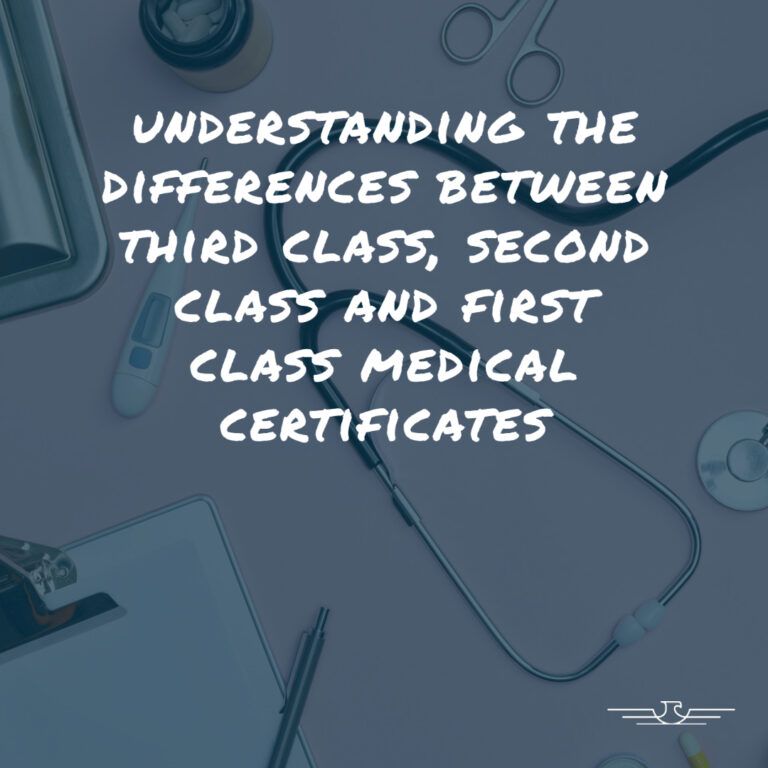Aviation is a highly regulated industry, and pilots are required to meet certain medical standards to ensure the safety of air travel. The Federal Aviation Administration (FAA) in the United States issues different classes of medical certificates for pilots, namely Third Class, Second Class, and First-Class, each with its specific requirements and privileges. Below we will explore the differences between these medical certificates, including their intended use, validity, renewal requirements, application process, and automatic disqualifying medical conditions and medications that could prevent someone from becoming a pilot.
Third-Class Medical Certificate
The Third-Class Medical Certificate is the most basic medical certificate and is required for pilots who operate aircraft for personal or recreational purposes. It is typically used by private pilots who do not receive any compensation for their flights. The Third Class Medical Certificate is valid for 60 months for pilots under the age of 40 and 24 months for pilots aged 40 and over. However, after the age of 60, it is only valid for 12 months.
To renew a Third Class Medical Certificate, pilots must undergo a medical examination by an FAA-approved aviation medical examiner (AME) and submit the necessary paperwork to the FAA. The examination typically includes a review of the pilot’s medical history, a physical examination, vision and hearing tests, and an evaluation of any medications the pilot may be taking. Pilots may also be required to provide additional medical documentation or undergo further tests depending on their medical history.
To apply for a Third Class Medical Certificate, pilots can schedule an appointment with an FAA-approved AME. The AME will conduct the medical examination and submit the necessary paperwork to the FAA on behalf of the pilot. Pilots can find a list of AMEs on the FAA’s website.
Second-Class Medical Certificate
The Second-Class Medical Certificate is required for pilots who operate aircraft for compensation or hire, such as those who work as commercial pilots. It is also required for pilots who operate aircraft with more than six passenger seats, turbojet-powered aircraft, or other aircraft specified by the FAA. The Second Class Medical Certificate is valid for 12 months regardless of the pilot’s age.
To renew a Second Class Medical Certificate, pilots must undergo a medical examination by an FAA-approved AME and submit the necessary paperwork to the FAA, similar to the requirements for a Third Class Medical Certificate. The examination may be more extensive than the one for a Third Class Medical Certificate, and pilots may be required to provide additional medical documentation or undergo further tests.
To apply for a Second Class Medical Certificate, pilots can schedule an appointment with an FAA-approved AME and undergo the required medical examination.
First-Class Medical Certificate
The First-Class Medical Certificate is the highest level of medical certification and is required for pilots who work as airline transport pilots (ATPs) or those who operate aircraft with more than nine passenger seats or cargo planes with a maximum takeoff weight of over 12,500 pounds. The First-Class Medical Certificate is also required for pilots who are applying for a type rating, which is a specific qualification to fly a certain type of aircraft. The First-Class Medical Certificate is valid for 12 months for pilots under the age of 40 and 6 months for pilots aged 40 and over.
To renew a First-Class Medical Certificate, pilots must undergo a more comprehensive medical examination by an FAA-approved AME and submit the necessary paperwork to the FAA. The examination may include additional tests and evaluations compared to the requirements for Third and Second Class Medical Certificates, and pilots may need to provide more detailed medical history and documentation.
To apply for a First-Class Medical Certificate, pilots can schedule an appointment with an FAA-approved AME and undergo the required medical examination, which is more comprehensive compared to the exams for lower class medical certificates.
Automatic Disqualifying Medical Conditions and Medications
There are certain medical conditions and medications that can automatically disqualify a pilot from obtaining any class of medical certificate. These conditions include, but are not limited to:
· Cardiovascular disease, such as heart attack, angina, or heart surgery.
· Epilepsy or a history of seizures.
· Diabetes requiring insulin or other hypoglycemic medication.
· Mental health conditions that may impair cognitive or judgmental abilities.
· Substance abuse or dependence.
· Certain neurological disorders.
· Chronic use of medications that may impair cognitive or motor function.
· Certain visual or hearing impairments that do not meet the FAA’s standards.
· History of or current respiratory disease, such as severe asthma or chronic obstructive pulmonary disease (COPD).
· History of or current cancer that is likely to interfere with the ability to perform as a pilot.
It’s important to note that the list of disqualifying medical conditions and medications is not exhaustive, and pilots should consult the FAA’s medical certification guidelines for a comprehensive understanding of the medical requirements.
In addition to the above, some medications, even if used for temporary conditions, may also be disqualifying or require a waiting period before a pilot can be issued a medical certificate. Pilots should always check with an FAA-approved AME and disclose all medications they are taking to determine their eligibility for a medical certificate.
Aviation medical certificates play a crucial role in ensuring the safety of air travel by setting medical standards for pilots. The Third Class, Second Class, and First-Class Medical Certificates have different requirements and validity periods based on the type of flying a pilot intends to do. Pilots need to carefully assess their medical history and medication use to determine their eligibility for a medical certificate and consult an FAA-approved AME for guidance. Understanding the differences between these medical certificates and the medical requirements for pilots is essential for aspiring pilots and those who are currently in the aviation industry to maintain their medical certification and continue to fly safely.





